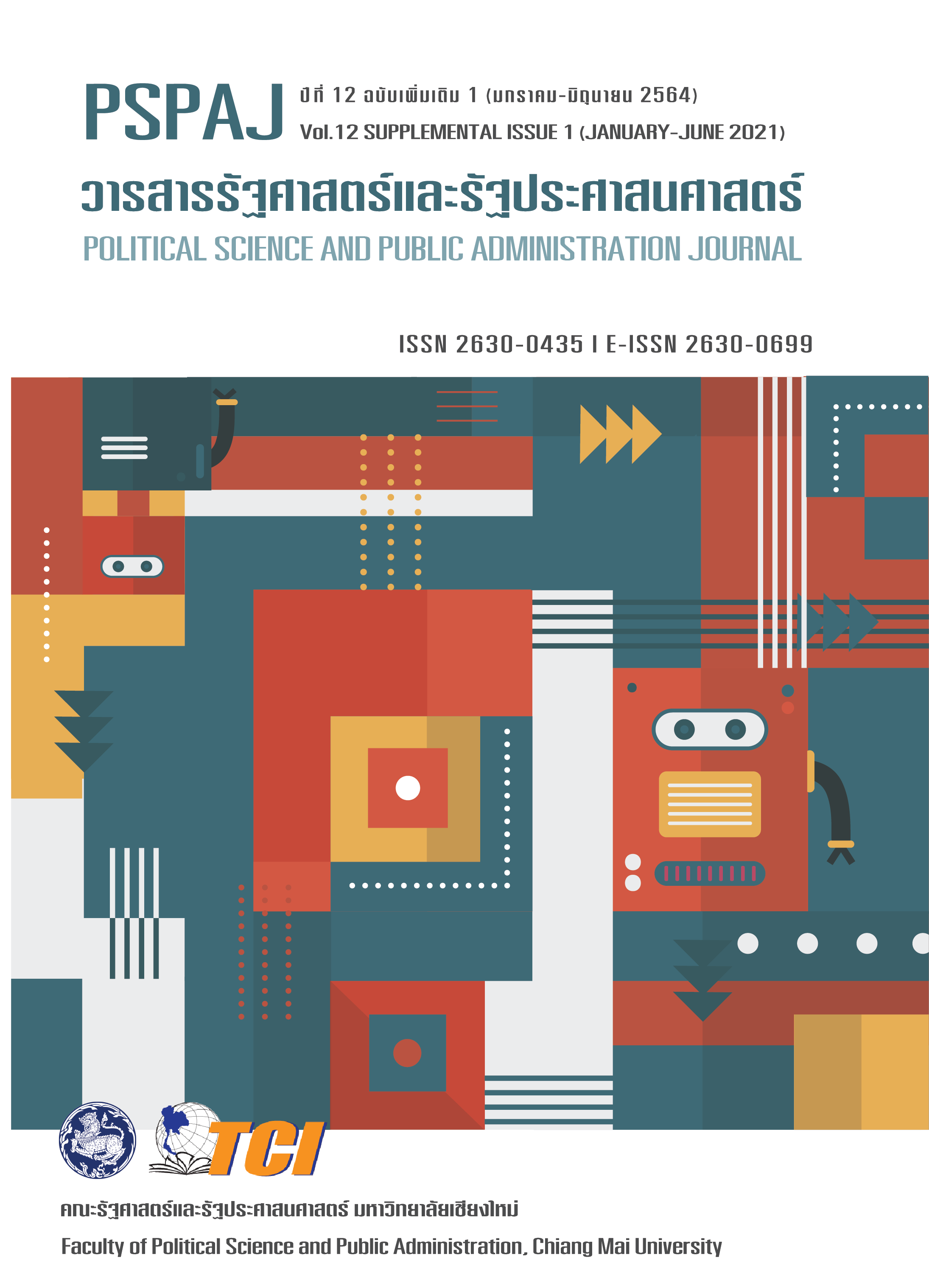The Synthesis of Smart City Roles Affecting to Reduce Social Inequality: The Meta – Synthesis
Main Article Content
Abstract
A smart city is a model of city development applying a variety of technologies to provide people with public service and urban administrative assistance. Most people usually recognize that the roles of smart city are specifically involved in such scientific issues as information technology, engineering, and city design. In fact, such roles are related to other dimensions, especially those in social science. The primary objective of this article, therefore, was to synthesize the roles of smart city that affect the reduction of social inequality. Applying the meta-synthesis method to electronic academic databases in social science and inter-disciplinary, three databases were deliberately selected, resulting in 10 articles to be synthesized. The results revealed that the roles of smart city affecting the social inequality reduction comprised 5 issues: 1) the creation of fairness in resource allocation for citizens, 2) the urban development and transparent bureaucratic system, 3) the career promotion and income enhancement, 4) the encouragement of communication and public engagement, and 5) the promotion of equality in gender and social class. So, it can be stated that technologies and innovations that help develop the city are also advantageous to the citizens since they could initiate equal access to benefits, services, and information, reducing former obstacles that cause inequality of opportunity in public service.
Downloads
Article Details
- เนื้อหาและข้อมูลที่ลงตีพิมพ์ในวารสารรัฐศาสตร์และรัฐประศาสนศาสตร์ถือเป็นข้อคิดเห็นและความรับผิดชอบของผู้เขียนบทความโดยตรง ซึ่งกองบรรณาธิการวารสารรัฐศาสตร์และรัฐประศาสนศาสตร์ ไม่จำเป็นต้องเห็นด้วย หรือร่วมรับผิดชอบใดๆ
- บทความและข้อมูล ที่ได้รับการตีพิมพ์ในวารสารรัฐศาสตร์และรัฐประศาสนศาสตร์ ถือเป็นลิขสิทธิ์ของวารสาร หากบุคคลหรือหน่วยงานใดต้องการนำข้อมูลไปใช้ประโยชน์ในทางวิชาการ ขอให้อ้างอิงแหล่งที่มาด้วย
References
ณัฐวุฒิ อัศวโกวิทวงศ์, ขวัญพร บุนนาค, และนภัส วัฒโนภาส. (2561). ความเหลื่อมล้ำในเมืองมหานคร บทปริทรรศน์ความรู้ในบริบทประเทศไทย. วารสารวิชาการ สิ่งแวดล้อมสรรค์สร้างวินิจฉัย คณะสถาปัตยกรรมศาสตร์ มหาวิทยาลัยขอนแก่น, 17(2), 157-178.
นิติบดี ศุขเจริญ, และวัยวุฑฒ์ อยู่ในศีล. (2557). การวิเคราะห์อภิมานและการสังเคราะห์อภิมาน. วารสารมหาวิทยาลัยราชภัฎมหาสารคาม (มนุษยศาสตร์และสังคมศาสตร์), 8(3), 43-56.
บุญนาค ตีวกุล. (2545). เมืองและสิ่งแวดล้อม. กรุงเทพฯ: คณะศึกษาศาสตร์ มหาวิทยาลัยศิลปากร.
สำนักงานส่งเสริมเศรษฐกิจดิจิทัล. (2563). แผนส่งเสริมการพัฒนาเมืองอัจฉริยะ. สืบค้นเมื่อ 4 กุมภาพันธ์ 2563, จาก https://www.depa.or.th/th/smart-city-plan
Adapa, S. (2018). Indian Smart Cities and Cleaner Production Initiatives-Integrated Framework and Recommendations. Journal of Cleaner Production, 172, 3351-3366.
Ahvenniemi, H., Huovila, A., Pinto-Seppä, I., & Airaksinen, M. (2017). What are the Differences Between Sustainable and Smart Cities? Cities, 60(1), 234-245.
Alizadeh, T. (2017). An Investigation of IBM’s Smarter Cities Challenge: What do Participating Cities Want? Cities, 63, 70-80.
Bansal, N., Mukherjee, M., & Gairola, A. (2017). Smart Cities and Disaster Resilience. In Seta, F, Sen, J., Biswas, A., & Khare, A. (Eds.). From Poverty, Inequality to Smart City (pp. 109-122). Springer Transactions in Civil & Environmental Engineering.
Chourabi, H., Nam, T., Walker, S., Gil-Garcia, J. R., Mellouli, S., Nahon, K., et al. (2012). Understanding Smart Cities: An Integrative Framework. In 2012 45th Hawaii International Conference on System Sciences. (pp. 2289-2297). Hawaii: IEEE.
Given, L. M. (2008). The SAGE Encyclopedia of Qualitative Research Methods. Thousand Oaks, CA: SAGE Publications, Inc.
Gu. J., & Tang. X. (2007). Meta-Synthesis. System Approach to Knowledge Science. International Journal of Information Technology& Decision Making, 6(3), 559-572.
Gudowsky, N., Sotoudeh, M., Capari, L., & Wilfing, H. (2017). Transdisciplinary Forward-Looking Agenda Setting for Age-Friendly, Human Centered Cities. Futures, 90, 16-30.
Hardoy, J. E., Mitlin, D., & Satterthwaite, D. (2013). Environmental Problems in an Urbanizing World. New York: Routledge.
Hatuka, T., & Zur, H. (2019). Who is the “smart” Resident in the Digital Age? The Varied Profiles of Users and Non-Users in the Contemporary City. Urban Studied, 57(6), 1260-1283.
Lynch, C. R. (2019). Contesting Digital Futures: Urban Politics, Alternative Economies, and the Movement for Technological Sovereignty in Barcelona. Antipode, 52(3), 660-680.
Martin, C., Evans, J., Karvonen, A., Paskaleva, K., Yang, D., & Linjordet, T. (2019). Smart-Sustainability: A New Urban Fix?. Sustainable Cities and Society, 45, 640-648.
Meijer, A., Bolivar, & M. P. R. (2015). Governing the Smart City: A Review of the Literature on Smart Urban Governance. International Review of Administrative Sciences, 82(2), 392-408.
Michalec, A. O., Hayes, E., & Longhurst, J. (2019). Building Smart Cities, the Just Way. A Critical Review of “smart” and “just” Initiatives in Bristol, UK. Sustainable Cities and Society, 47, 1-8.
Miklian, J., & Hoelscher, K. (2017). Smart Cities, Mobile Technologies and Social Cohesion in India. Indian Journal of Human Development, 11(1), 1-16.
Praharaj, S., Han, J. H., & Hawken, S. (2017). Innovative Civic Engagement and Digital Urban Infrastructure: Lessons from 100 Smart Cities Mission in India. Procedia Engineering, 180, 1423-1432.
United Nations. (2011). World Urbanization Prospects: The 2011 Revision. New York: Department of Economic and Social Affair.
______. (2015). World Urbanization Prospects: The 2014 revision. New York: Department of Economic and Social Affair.
Yamini, J. S. (2019). Is Smart Mobility Also Gender-Smart?. Journal of Gender Studies, 29(7), 832-846.
Yigitcanlar, T., Kamruzzaman, Md., Foth, M., Sabatini-Marques, J., Da Costa, E., & Ioppolo, G. (2019). Can Cities Become Smart Without Being Sustainable? A Systematic Review of the Literature. Sustainable Cities and Society, 45, 348-365.


